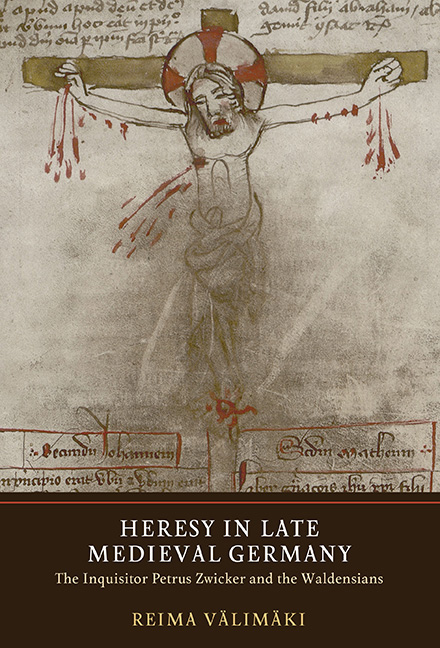Book contents
- Frontmatter
- Dedication
- Contents
- List of Illustrations
- Author's Note
- Acknowledgements
- List of Abbreviations
- Introduction
- 1 Petrus Zwicker and the Career of an Inquisitor at the Turn of the Fifteenth Century
- 2 The Inquisitor Writes
- 3 The Inquisitor's Practice and his Legacy
- 4 Communicating Faith
- 5 The Dissidents, the Clergy and the Church
- Epilogue: The Consolation of Inquisition
- Appendix 1 Manuscript Descriptions
- Appendix 2 Chapters and Titles of the Cum dormirent homines according to Jacob Gretser (1613/77)
- Appendix 3 The Circulation of the Processus Petri together with the Cum dormirent homines
- Appendix 4 Inquisitors' Manuals of St Florian and Linz
- Appendix 5 Collation of Formularies in St Florian, MS XI 234 and Würzburg, UB MS M. ch. f. 51
- Bibliography
- Index
- YORK MEDIEVAL PRESS: PUBLICATIONS
4 - Communicating Faith
Published online by Cambridge University Press: 26 March 2019
- Frontmatter
- Dedication
- Contents
- List of Illustrations
- Author's Note
- Acknowledgements
- List of Abbreviations
- Introduction
- 1 Petrus Zwicker and the Career of an Inquisitor at the Turn of the Fifteenth Century
- 2 The Inquisitor Writes
- 3 The Inquisitor's Practice and his Legacy
- 4 Communicating Faith
- 5 The Dissidents, the Clergy and the Church
- Epilogue: The Consolation of Inquisition
- Appendix 1 Manuscript Descriptions
- Appendix 2 Chapters and Titles of the Cum dormirent homines according to Jacob Gretser (1613/77)
- Appendix 3 The Circulation of the Processus Petri together with the Cum dormirent homines
- Appendix 4 Inquisitors' Manuals of St Florian and Linz
- Appendix 5 Collation of Formularies in St Florian, MS XI 234 and Würzburg, UB MS M. ch. f. 51
- Bibliography
- Index
- YORK MEDIEVAL PRESS: PUBLICATIONS
Summary
Debet igitur divinarum scripturarum tractator et doctor, defensor rectae fidei ac debellator erroris, et bona docere et mala dedocere.
So the interpreter and teacher of the divine scriptures, the defender of the true faith and vanquisher of error, must communicate what is good and eradicate what is bad.
Augustine of Hippo, De doctrina christiana, IV.4.
In the previous chapters I have discussed the pastoralization of heresy in the inquisitorial procedure, in other words the change of paradigm in the approach to Waldensianism and its inquisition that emerged in the circle around Petrus Zwicker and Martinus of Prague in the 1390s. The present chapter demonstrates that the increasingly pastoral and doctrinal approach to heresy did not stay confined to a limited circle of inquisitors, but was both consciously promoted in the surrounding society and at times eagerly received by contemporaries.
First, I shall look at instances when inquisitors themselves were able to communicate their message to the laity and the parish clergy, first of all by preaching and the performance of sentences, and less obviously but no less importantly through summonses (citationes) to trials. Zwicker's summonses from the diocese of Passau, previously unknown to scholars, reveal that they were a carefully constructed and integral part of spreading the anti-heretical message. Read aloud in parish churches for several weeks, they, together with the public penances, made the accusations of heresy, guilt over transgression, as well as contrition and penitence, a visible, audible and tangible part of life in the areas where inquisitors operated. Zwicker preached to converted heretics and good Catholics alike, but his sermons have not been preserved. I shall, however, draw attention to certain homiletic passages in the Cum dormirent homines that suggest the probable contents of Zwicker's anti-heretical sermons.
Secondly, I shall discuss the transmission of Zwicker's polemical language to contemporary devotional literature. Ulrich von Pottenstein's catechetic compilation includes a unique case of the translation of a Latin anti-heretical treatise, the Cum dormirent homines, into the vernacular in the lifetime of the work's author, and in the same geographical area where he had conducted inquisitions.
- Type
- Chapter
- Information
- Heresy in Late Medieval GermanyThe Inquisitor Petrus Zwicker and the Waldensians, pp. 171 - 216Publisher: Boydell & BrewerPrint publication year: 2019



